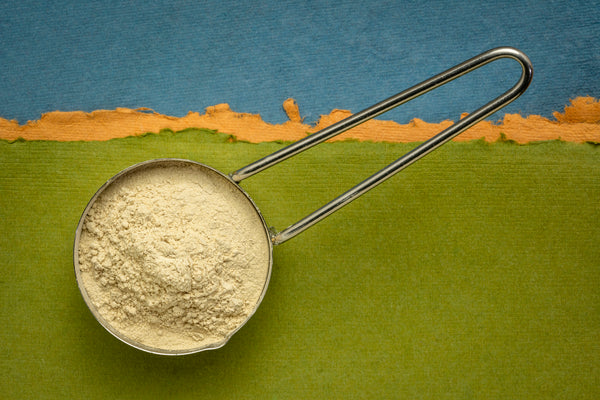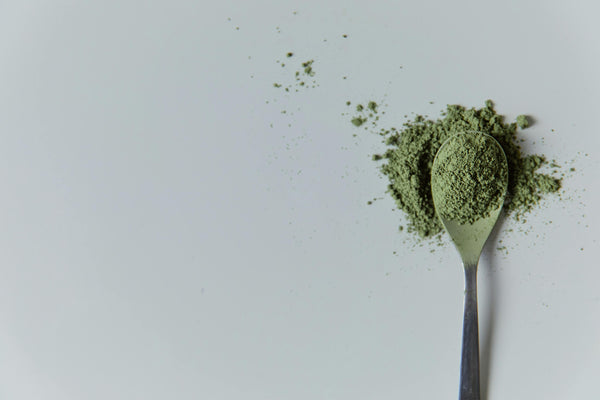Stress has become a common issue that many people struggle with. This has led to a growing interest in natural supplements that can help reduce stress and anxiety and promote relaxation. Two popular options are l-theanine and ashwagandha, both known for their stress-relieving properties. Explore these two supplements in greater detail, including their benefits, potential side effects, and how they can be incorporated into a wellness routine to help manage stress effectively.
What is Ashwagandha?
Ashwagandha is an adaptogen renowned for its stress-relieving properties and holistic approach to enhancing overall well-being. With a long history deeply rooted in traditional Ayurvedic medicine, ashwagandha, also known as Withania somnifera, has been utilized for centuries to combat stress and promote vitality. Ashwagandha is thought to exert its calming effects by modulating levels of GABA (gamma-aminobutyric acid), a neurotransmitter known for its role in promoting a sense of calm and reducing anxiety. This adaptogenic herb contains a plethora of active ingredients, including withanolides and alkaloids, which contribute to its therapeutic properties. These bioactive compounds work synergistically to help the body adapt to stressors, bolstering resilience and improving mental clarity. As a result, ashwagandha has garnered attention in modern times as a natural solution for stress management and promoting a sense of calm amidst life's daily challenges.
What is L-Theanine?
L-Theanine, classified as an amino acid, is a naturally occurring compound found abundantly in green tea leaves. As a common ingredient in various supplements and beverages, l-theanine has garnered attention for its potential to promote a calm state and reduce stress. This amino acid is renowned for its ability to help improve cognitive function and mood without inducing drowsiness. L-theanine acts by modulating neurotransmitter levels in the brain, particularly increasing levels of GABA, serotonin, and dopamine, which are play a role in feelings of calmness, happiness, and focus. Additionally, l-theanine has been shown to counteract the stimulating effects of caffeine, often found in green tea, promoting a state of relaxed alertness. Overall, l-theanine is recognized for its multifaceted benefits in supporting mental well-being and enhancing cognitive performance.
L-theanine vs. Ashwagandha: Comparing the Two

When it comes to natural supplements for promoting relaxation and overall well-being, both l-theanine and ashwagandha have gained popularity. While they share some similarities in their effects, there are also distinct differences between the two. Let's delve into the health benefits and potential side effects of each.
Benefits of L-Theanine
L-Theanine, primarily found in tea leaves, especially in green tea, offers several potential benefits:
- Promotes Relaxation: L-theanine is renowned for its ability to induce a state of relaxation without causing drowsiness, making it a popular choice for stress relief.
- Improved Focus and Cognitive Function: Studies suggest that l-theanine works to enhance cognitive function, including attention and memory, by increasing alpha brain wave activity.
- Supports Sleep Quality: Some research indicates that l-theanine may improve sleep quality by reducing anxiety and promoting relaxation before bedtime.
- Antioxidant Properties: L-theanine exhibits antioxidant properties, which may help protect cells from damage caused by free radicals.
Four weeks of l-theanine supplementation (200 mg/day) on stress-related symptoms and cognitive functions found that participants experienced reductions in depression, anxiety, and sleep disturbances after l-theanine intake, as indicated by lower scores on various assessment scales. Additionally, improvements were observed in verbal fluency and executive function among participants who received l-theanine compared to those who received a placebo. These findings suggest that l-theanine supplementation may have beneficial effects on mental health and cognitive performance in individuals experiencing stress-related symptoms.
Another double-blind, randomized, placebo-controlled study aimed to investigate the cognitive effects of l-theanine intake in Japanese adults aged 50–69 years. Using a cognitive test battery, researchers found that a single dose of l-theanine can lower reaction times in attention tasks and improved performance in working memory tasks after 12 weeks of regular intake. These findings suggest that l-theanine supplementation may enhance attention, working memory, and executive functions in older adults.
Overall, l-theanine can have beneficial effects on state of mind and cognitive function.
Benefits of Ashwagandha
Ashwagandha, an ancient medicinal herb, also offers various potential benefits:
- Stress Reduction: Ashwagandha is well-known for its adaptogenic properties, which supports stress management by reducing cortisol levels.
- Enhanced Mood: Research suggests that ashwagandha may help alleviate symptoms of anxiety and depression by regulating neurotransmitters in the brain.
- Improved Energy Levels: Some studies indicate that ashwagandha may increase energy levels and reduce fatigue, promoting overall vitality.
- Supports Immune Function: Ashwagandha has been shown to have immune-modulating effects, potentially enhancing the body's ability to fight infections.
In a 60-day, randomized, double-blind, placebo-controlled study, researchers examined the anxiolytic effects of ashwagandha extract in stressed, healthy adults. Participants taking 240 mg of ashwagandha extract daily experienced a significant reduction in anxiety and a notable decrease in stress levels. Moreover, ashwagandha intake was associated with lower levels of morning cortisol and DHEA-S, suggesting its potential in modulating the HPA axis.
Overall, ashwagandha can be an effective supplement to help regulate instances of stress and energy imbalance.
Potential Side Effects of L-Theanine
While l-theanine is generally considered safe for most individuals, some may experience mild side effects such as headaches, dizziness, or gastrointestinal discomfort. High doses of l-theanine could potentially cause drowsiness, particularly when combined with sedative medications or alcohol. Consult with a healthcare professional before starting l-theanine supplementation, especially for individuals with underlying health conditions or those taking medications.
Potential Side Effects of Ashwagandha
Ashwagandha is well-tolerated by most people, but in some cases, it may cause mild gastrointestinal issues like nausea or diarrhea, particularly when taken in high doses. Consider consulting with a healthcare provider before using ashwagandha supplements if you have pre-existing health conditions or health concerns.
Can I Take L-Theanine and Ashwagandha Together?

Combining L-Theanine and Ashwagandha is a common practice for those seeking comprehensive support for stress relief and relaxation. While both supplements offer unique benefits on their own, taking them together may potentially enhance their effects synergistically.
Considerations When Taking L-Theanine and Ashwagandha Together:
- Synergistic Benefits: Combining l-theanine and ashwagandha can offer synergistic benefits for stress relief and overall well-being. L-theanine promotes relaxation by increasing GABA levels, while ashwagandha acts as an adaptogen, helping the body cope with stressors.
- Enhanced Cognitive Function: Together, these supplements may enhance cognitive function, mood stability, and mental clarity without causing drowsiness.
- Balanced Energy: While l-theanine can counteract the stimulating effects of caffeine, ashwagandha may provide a subtle energy boost without the jitters.
- Personalized Approach: Some individuals may find that combining l-theanine and ashwagandha enhances their stress-relief regimen, but others may achieve satisfactory results with either supplement alone.
- Start with Low Doses: If you're new to l-theanine or ashwagandha supplementation, it's advisable to start with low doses of each supplement when combining them. This allows you to assess how your body responds to the combination and minimize the risk of adverse effects.
- Consider Timing and Dosage: The timing and dosage of l-theanine and ashwagandha may impact their effectiveness when taken together. Some people prefer to take l-theanine during the day for its calming effects, while ashwagandha may be taken in the evening to promote relaxation and sleep. Experiment with different dosages and timing to find what works best for you. However, both ingredients are well tolerated at all times of day.
- Monitor for Adverse Effects: Pay close attention to how your body reacts to the combination of l-theanine and ashwagandha. While both supplements are generally well-tolerated, some individuals may experience side effects such as headaches, digestive issues, or drowsiness.
- Consult with a Healthcare Professional: Before combining l-theanine and ashwagandha, consider consulting with a healthcare professional, especially if you have underlying health conditions or are taking medications. A healthcare provider can offer personalized advice based on your individual health status and goals.
In conclusion, combining l-theanine and ashwagandha may offer complementary benefits for stress relief, relaxation, and overall well-being. However, it's essential to approach their combination cautiously, starting with low doses, monitoring for adverse effects, and consulting with a healthcare professional if necessary. By taking these precautions, you can safely enjoy the potential synergistic effects of l-theanine and ashwagandha together.
How to Take Ashwagandha and L-Theanine Together
Pairing ashwagandha root extract with l-theanine doses can offer a potent calming effect and help ease stress and anxiety. Ashwagandha's renowned stress-reducing properties complement the soothing attributes of l-theanine, making them an ideal combination.
To maximize the benefits of ashwagandha and l-theanine, consider integrating them into your daily routine strategically. Depending on individual needs, 300-600 mg of ashwagandha is a typical dosage. For l-theanine, the recommended dosages ranging from 100-200 mg, to promote relaxation and mental clarity. Both ingredients can be taken at any time of day. Find a time that best suits your routine to encourage consistent use, which will help maximize the ingredients' long-term benefits on your health.
By incorporating both ashwagandha and l-theanine into your daily regimen, you can naturally combat stress and anxiety, fostering a more balanced and relaxed mood throughout the day.
Wrapping Up
When it comes to choosing between ashwagandha vs. l-theanine, it all depends on your individual needs and preferences. Both supplements have their own unique benefits, with l-theanine known for its calming effects and ashwagandha for its adaptogenic properties. While l-theanine can help reduce anxiety and promote relaxation, ashwagandha is more commonly used to combat stress and improve overall well-being. Some people may find that a combination of both supplements is right for them, as they each target different aspects of mental health and stress management. Ultimately, the decision between l-theanine vs. ashwagandha boils down to personal preference and what works best for your specific needs.